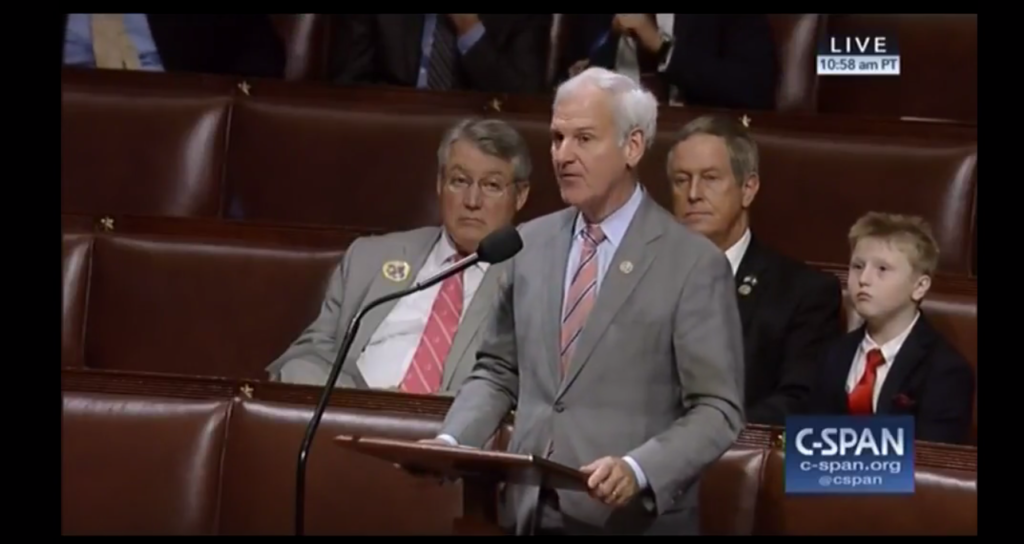Bradley Byrne: Putting Americans back to work

You have probably read the stories about how Republicans and Democrats can never get along and how it has caused absolutely nothing to get done in Washington. While that may make a good narrative for the media, it is not accurate. In fact, just this past week, Congress came together in a bipartisan way to pass bills that will help put the American people back to work. I was especially proud of our bipartisan efforts to boost our nation’s career and technical education (CTE) programs. These programs are critical in helping connect Americans with the skills they need to find a good-paying job. There is a false belief in our country that in order to be successful you have to obtain a four year degree or more. That simply is not true. In fact, many Americans have successful lives after attending a community college or gaining a certificate from a training program. That is what career and technical education is all about. Back when I served as chancellor of Alabama’s two year college system, I saw these programs work firsthand. I saw individuals who had absolutely no background or prior training go through a welding program and end up with a great job that pays high wages. These programs truly work like magic. CTE programs are so important in today’s economy because our country is experiencing a skills gap. This means there are jobs out there that remain unfilled because people lack the skills required to fill the jobs. This is limiting economic growth and hurting the overall economy. Well, CTE programs can help close that skills gap by giving people the training they need. Our bipartisan bill, the Strengthening Career and Technical Education (CTE) for the 21st Century Act, makes important reforms to ensure our CTE programs are actually working and directs resources toward in-demand skill areas. Importantly, the bill ensures a limited role for the federal government while empowering state and local leaders. Ultimately, improving career and technical education programs is the most important thing Congress can do to help close the skills gap, combat poverty, and help put Americans back to work. On another bipartisan note, the House also passed a bill last week to help people on welfare programs have access to jobs. The bill would establish a test program for states to create a targeted tax credit for employers who hire individuals on welfare programs. The bill, the Accelerating Individuals into the Workforce Act, passed on a strong bipartisan vote of 377 to 34, and it makes progress on the important priority of encouraging work among welfare recipients. As we continue our efforts to fight poverty, we must measure success by how many people we are getting off of welfare programs and back to work, not by how many people we are adding to the welfare rolls. Through improving career and technical education and encouraging work in welfare, there will be three big wins for the American people. First, we will help individuals live more successful lives by connecting them with jobs. Second, we will grow the overall American economy by closing the skills gap. Third, we will save taxpayers money by taking people off welfare and putting them to work. So, while there are certainly issues where Republicans and Democrats do not agree, there are a large number of areas where we often come together and make a difference on behalf the American people. That is exactly what we did this past week with our efforts to create more opportunities for the American people through boosting career and technical education and promoting work in our nation’s welfare programs. • • • Bradley Byrne is a member of U.S. Congress representing Alabama’s 1st Congressional District.
Byrne, Roby celebrate House passage of bill to overhaul career-tech education

Americans face a job market vastly different from the one that existed a generation ago. With constant advances in technology and an ever-growing global economy, the kinds of jobs available require high-quality education and skills development vital to competing in today’s workplaces. Since 1984, the Carl D. Perkins Career and Technical Education Act has endeavored to provide federal support to state and local career and technical education, or CTE, programs. But the law has not been updated in more than a decade, and no longer reflects the realities and challenges facing students and workers. Which is why the House of on Thursday approved a bill update the law and help all Americans access the education they need to earn a lifetime of success. H.R. 2353, the Strengthening Career and Technical Education (CTE) for the 21st Century Act, passed on a voice vote, reauthorizes and updates the Carl D. Perkins Career and Technical Education Act and includes some important reforms: Empowers state and local community leaders; Improves alignment with in-demand jobs; Increases transparency and accountability to ensure programs deliver results; Simplifies the application process Provides greater flexibility to program administrators so they can adjust to changing needs; Ensures a limited federal role in education. Alabama 1st District U.S. Rep. Bradley Byrne, Chairman of the House Workforce Protections Subcommittee, today celebrated the passage of the bill saying it will have a “huge impact at creating opportunities for Americans in Southwest Alabama and around the country.” “Improving career and technical education programs is the most important thing Congress can do to help close the skills gap, combat poverty, and put Americans back to work,” said Byrne. “I’ve seen these programs firsthand dating back to my time as Chancellor of Alabama’s two-year college system, and they truly work like magic. “This is the type of bipartisan bill that will never get the attention it deserves, but it will have a huge impact at creating opportunities for Americans in Southwest Alabama and around the country.” His Alabama House colleague, 2nd District U.S. Rep. Martha Roby echoed his sentiments. “I’m a big believer in Career Tech programs for three simple reasons: They help prepare students for rewarding careers; They ensure American workers have the tools necessary for skilled trades that are foundational to our society; And, they boost our economy by providing a quality workforce,” said Roby ahead of the vote. “With the modern workplace changing at a rapid pace, it is imperative that educators and facilities keep up. With this bill, these programs can continue to successfully connect today’s students with the careers of tomorrow.” Byrne delivered a speech on the House floor in support of the bipartisan legislation. Watch below: A transcript of Byrne’s remarks can be found below: I thank the Chairwoman for yielding, and I am proud to rise in support of this strong, bipartisan legislation. Improving career and technical education programs is the most important thing Congress can do to help close the skills gap, combat poverty, and help put Americans back to work. Studies clearly show that there are unfilled, high wage jobs out there that remain open because people lack the skills to fill the jobs. That’s where CTE comes in. When I was Chancellor of Alabama’s two-year college system, I saw firsthand just how impressive these programs are. They really do work like magic by taking an untrained worker and giving them the skills they need to fill an in-demand job. It is a win-win situation for everyone. So, Mr. Speaker, I am proud to be an original co-sponsor and supporter of this legislation, I encourage my colleagues to join me in supporting this reform-oriented bill that helps build the 21st Century workforce. Watch Roby’s floor speech below:
Bradley Byrne votes to boost career and technical education

Alabama 1st District U.S. Congressman Bradley Byrne, a member of the House Education and the Workforce Committee, on Tuesday voted in favor of legislation to boost and reform America’s career and technical education (CTE) programs. The U.S. House of Representatives passed H.R. 5587 — the Strengthening Career and Technical Education for the 21st Century Act — which limits the federal government’s role and empowers states and local community leaders by giving them greater flexibility over how they use federal funds for career and technical education. As an original co-sponsor, Byrne helped write and introduce the legislation, which passed by a vote of 405 to 5 with the support of the entire Alabama delegation, excluding Rep. Terri Sewell, who did not vote. During debate on the bill, Byrne spoke on the House floor about the importance of career and technical education, and he also highlighted important CTE programs in Southwest Alabama. “You see, for too long, we have devalued the importance of career and technical education here in America,” said Byrne on the House floor. “The programs were seen as some sort of second-rate option for students who couldn’t make it otherwise.” “That simply isn’t the case,” Byrne continued, “Instead, CTE programs offer real opportunities to students of all ages and from all backgrounds. And, with this bill, we are making it clear that career and technical education is a critical educational option that leads to good-paying jobs.” Among the many reforms included in the bill, H.R. 5587 would: Empower state and local community leaders; Improve alignment with in-demand jobs; Increase transparency and accountability; and Ensure a limited federal role. The legislation is supported by a range of organizations including the U.S. Chamber of Commerce, the Alabama Association of School Boards, the School Superintendents Association, the National Association of Manufacturers and the American Farm Bureau Federation.


